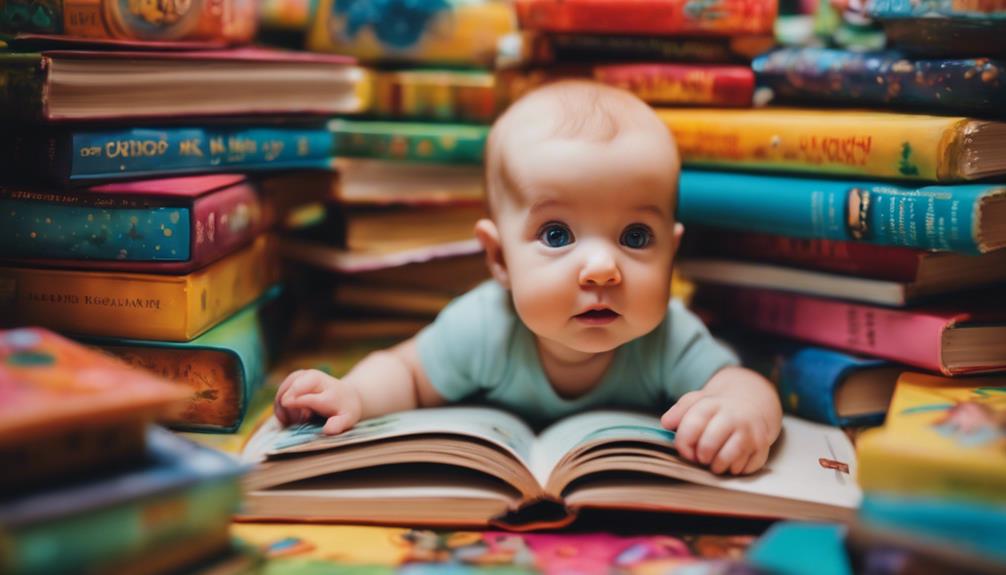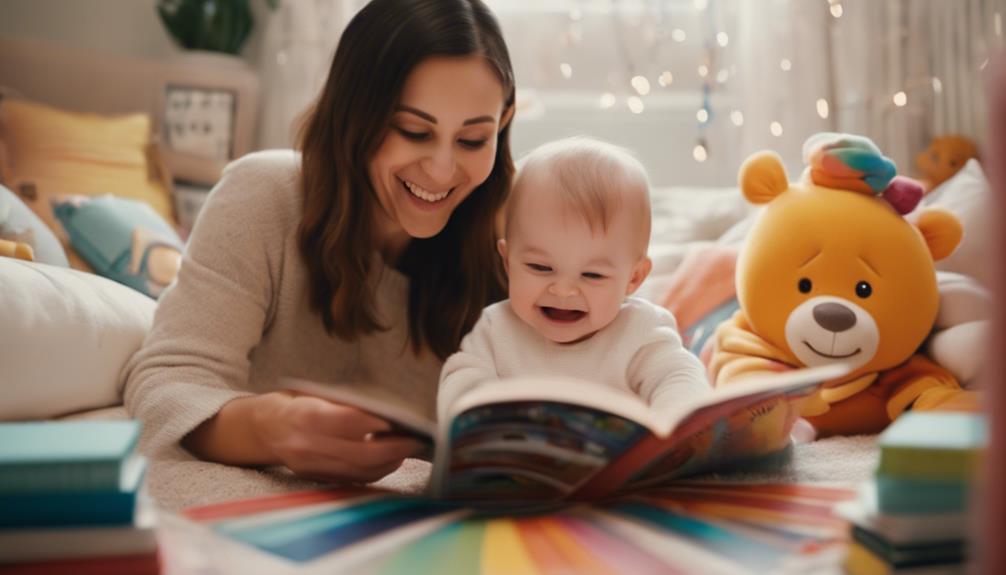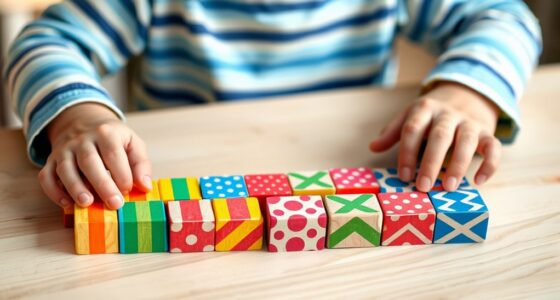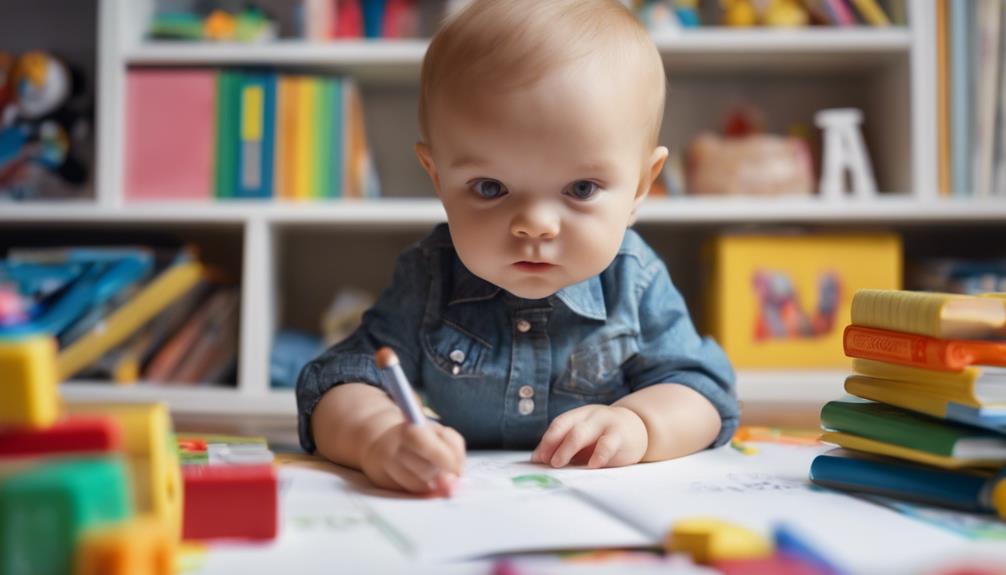Reading to your baby enhances language skills, nurtures a love for learning, and sets the stage for academic success. It improves vocabulary, sharpens cognitive abilities, and strengthens your bond. Shared stories spark imagination, while diverse perspectives broaden horizons. By participating in reading sessions, you are laying the groundwork for success, building a framework of knowledge and understanding. So, delve deeper to discover the numerous benefits that await your little one’s development.
Key Takeaways
- Reading to your baby enhances language development and literacy skills.
- Shared reading fosters a strong parent-child bond and emotional connection.
- Regular reading sessions stimulate imagination and cognitive growth.
- Reading cultivates a love for books, setting a foundation for academic success.
- Cultural exposure through stories broadens your baby's knowledge and understanding.
Benefits of Reading Aloud
Reading aloud to your baby enhances their language development by exposing them to a rich variety of words and complex language from an early age. This practice not only helps in building their vocabulary but also aids in strengthening the emotional connection between you and your little one. By reading to your baby, you're fostering a sense of safety and love, creating a strong bond that's important for their overall well-being.
Moreover, reading aloud contributes greatly to your baby's early brain development. As they listen to your voice, mimic expressions, and absorb new sounds, their cognitive growth is stimulated. Establishing a reading routine, especially before bedtime, provides a sense of security and predictability for your baby, promoting a soothing environment for restful sleep.
Furthermore, reading to your baby plays a crucial role in developing essential literacy skills that are fundamental for their future academic success. By exposing them to language early on, you're setting a solid foundation for their language proficiency and comprehension abilities.
Language Development Benefits

Enhancing your baby's language development through regular reading sessions involves exposing them to a diverse range of words and intricate language structures. Reading to your baby offers numerous benefits for their language skills, including:
- Improved Vocabulary: Regular reading introduces uncommon words, helping infants expand their vocabulary and grasp nuanced meanings.
- Enhanced Communication Skills: Babies who are read to frequently tend to exhibit better speech and communication skills, as they learn to mimic sounds and expressions from the stories.
- Stimulated Early Language Development: Reading stimulates infants' brains, aiding in their early language development and preparing them for successful communication in the future.
- Building a Strong Foundation in the Native Language: Early exposure to language through reading supports babies in learning their native language, laying a robust groundwork for their future language skills and fostering a deeper connection to their cultural roots.
Cognitive Growth Through Reading

By engaging in early literacy activities with your baby, you lay the foundation for cognitive growth through reading. Reading to your baby not only introduces them to language but also enhances their cognitive development. As you follow storylines in books together, you help nurture their reasoning abilities and problem-solving skills. Early exposure to reading plays an important role in fostering decision-making skills in infants. Through reading, your baby begins to understand logical sequences and consequences, which are essential for their cognitive growth.
Engaging in early literacy activities supports the development of logical thinking skills that are beneficial throughout life. By exposing your baby to books and reading from an early age, you're providing them with a strong foundation for developing critical thinking and reasoning abilities. These skills won't only aid in their academic pursuits but also in their overall cognitive growth and development.
Reading together creates a stimulating environment that encourages cognitive growth and logical thinking in your baby.
Building Parent-Child Bond

When you read to your baby, you aren't just sharing stories, but also creating a powerful bond. Through the simple act of reading, you establish a connection that's nurturing and enduring, fostering a sense of closeness that's invaluable.
This shared experience builds a foundation of trust and love that will shape your relationship for years to come.
Bonding Through Stories
Reading to your baby regularly strengthens the parent-child bond by creating shared experiences and fostering emotional connections through storytelling. When you engage in storytelling activities with your baby, you're building a strong foundation for your relationship.
Here's how bonding through stories can benefit both you and your little one:
- Shared Experiences: Reading together creates special moments that you both can cherish, enhancing your connection.
- Emotional Connections: Storytelling stimulates emotions like joy, empathy, and comfort, deepening your bond with your baby.
- Memorable Moments: The stories you share become lasting memories that strengthen your relationship over time.
- Secure Attachment: Research indicates that reading to babies promotes secure attachment styles, contributing to a healthier parent-child bond.
Connection via Reading
Strengthen the bond with your baby through the connection forged by sharing stories and reading together. Engaging in shared reading activities not only enhances communication skills but also fosters a closer relationship between you and your little one.
When you read aloud to your baby, you're promoting trust, comfort, and a profound feeling of connection with your caregiver. These regular reading sessions provide a special opportunity for quality time and meaningful interaction with your baby, creating lasting memories that contribute to a strong emotional bond.
Additionally, the act of reading to your baby plays an essential role in establishing a lifelong love for books and learning. By immersing your child in the world of stories and books from a young age, you're setting the foundation for a future filled with curiosity, imagination, and a deep appreciation for the written word.
Stimulating Imagination Early

By exposing your baby to diverse characters, settings, and storylines, you can help stimulate their imagination early on. Here are some ways in which reading aloud can enhance your baby's creativity and imagination:
- Development of Critical Thinking: Imaginative stories found in books can aid in the development of critical thinking skills from a young age.
- Exploration of Creativity: Engaging in storytelling activities with your baby encourages them to explore their creativity and imagination.
- Visualization and Interpretation: Reading aloud allows babies to visualize and interpret the narrative in their minds, fostering imaginative play.
- Embarking on Imaginative Journeys: Through books, babies can set out on imaginative adventures and explore worlds beyond their immediate surroundings.
Fostering Love for Books

To foster a love for books in your baby, focus on building early literacy skills, cultivating reading habits, and creating bonding moments through shared stories.
By establishing a routine of reading aloud, you can help your baby develop a strong foundation for lifelong learning and a passion for reading.
These simple yet powerful actions can enhance language development, cognitive skills, and emotional connections with your little one.
Building Early Literacy Skills
Reading to your baby from an early age is a powerful way to cultivate a deep love for books and lay the groundwork for essential literacy skills. Here are some key benefits of building early literacy skills through reading:
- Enhanced Language Development: Regular reading sessions with your baby stimulate their language skills, helping them communicate more effectively as they grow.
- Improved Cognitive Development: Exposure to books at a young age sparks your baby's imagination, creativity, and cognitive abilities, fostering holistic development.
- Positive Associations with Books: Reading to your baby creates a positive bond with books, encouraging them to see reading as an enjoyable activity rather than a chore.
- Foundation for Lifelong Literacy: By engaging in reading activities early on, you set the stage for a lifelong love of reading and learning.
Cultivating Reading Habits
Cultivating a love for books in your baby begins with incorporating regular reading sessions into your daily routine.
Establishing consistent reading habits early on can have a significant impact on fostering a lifelong habit of reading for pleasure.
When you engage in interactive reading experiences with your baby, you not only create a cozy and engaging environment but also stimulate their cognitive development and language skills.
These shared reading moments play an important role in enhancing the bond between you and your little one.
Creating Bonding Moments
Engaging in shared reading experiences with your baby cultivates strong bonds and nurtures a passion for books from an early age. This special time spent together not only strengthens the parent-child relationship but also lays the groundwork for a lifelong love for reading.
Here are some key ways in which creating bonding moments through reading can benefit both you and your baby:
- Enhanced Parent-Child Relationship: Sharing stories creates intimate moments that deepen your emotional connection and foster trust and security.
- Fostering Love for Reading: Reading together instills a joy for books and learning, setting the stage for a future filled with literary exploration and imagination.
- Improved Communication Skills: Engaging in dialogue during reading sessions helps develop language skills and promotes early communication abilities in your baby.
- Building Emotional Connections: Bonding over books creates cherished memories and strengthens the bond between parent and child, providing a sense of comfort and closeness.
Setting Up for Academic Success

Prepare your child for academic success by creating a supportive environment that encourages learning and growth. Reading aloud to your baby is a powerful tool in fostering academic success. Through daily reading routines, you can enhance your child's vocabulary, comprehension, and communication skills, setting them up for achievements in school and beyond. Research shows that children who engage in regular reading sessions with their parents are more likely to excel academically, leading to higher graduation rates and successful educational journeys. Shared reading experiences not only build a strong foundation for literacy but also instill a love for learning that is essential for academic triumph. To support your child's academic development, consider implementing the following techniques:
| Academic Success Techniques | Description |
|---|---|
| Reading Aloud Regularly | Enhances vocabulary, comprehension, and communication skills. |
| Establishing Daily Reading Routines | Builds a foundation for academic achievements and sets the stage for successful educational journeys. |
Importance of Cultural Exposure

Exposing your baby to diverse cultures through reading is essential for broadening their perspective and nurturing their creativity. Cultural exposure through books provides a gateway to a world of possibilities, fostering a positive attitude towards learning. Here's why it matters:
- Diverse Characters: Introducing your baby to characters from various backgrounds helps them appreciate the richness of different cultures and traditions.
- Different Perspectives: Stories in books open up discussions on a wide range of topics, enabling babies to explore diverse viewpoints and ideas.
- Lifelong Love for Books: Early exposure to cultural diversity through reading supports the development of a passion for learning and encourages a lasting affection for books.
- Positive Attitude Towards Learning: Shared reading experiences with diverse characters instill a positive attitude towards continuous learning, broadening your baby's knowledge base and understanding of the world.
Tips for Reading Sessions

During reading sessions with your baby, make sure you engage them by using expressive voices and commenting on pictures to enhance their experience. When you read, vary your tone to keep your baby interested and point out different objects in the pictures. Encourage interaction by asking questions like, 'Can you point to the dog?' or 'What color is the ball?'
Choose books with simple words and clear pictures to capture your baby's attention. Opt for books with repetitive text that your baby can start recognizing. Remember to let your baby touch the book, hold it, and even turn the pages. This tactile experience helps them explore and feel more connected to the story.
Establishing a daily reading routine, such as before naptime or bedtime, creates a comforting environment for your baby and makes reading a consistent and enjoyable activity. By incorporating these tips, you can make reading sessions engaging and beneficial for your baby's development.
Impact on Future Success

Reading to your baby daily can greatly impact their future success in various aspects of life. Here's how it can make a difference:
- Improved Language and Literacy Skills: Regular reading sessions can boost your baby's language skills and set a strong foundation for literacy, preparing them for academic success.
- Higher Education Achievement: Children who are exposed to reading from an early age are more likely to graduate from high school and pursue further education, opening doors to a successful future.
- Enhanced Cognitive Development: Early exposure to reading stimulates cognitive development, enhancing problem-solving abilities and logical thinking skills essential for success in various fields.
- Creativity and Imagination: Reading introduces your baby to diverse cultures, characters, and ideas, nurturing creativity and imagination, which are vital for future success in a rapidly changing world.
Supporting early literacy programs like United Way Imagination Library not only benefits your child but also contributes to the betterment of your community and future generations.
Frequently Asked Questions
Why Is It Important to Read to a Baby?
Reading to your baby is essential because it boosts language skills, encourages social interaction, and sparks imagination. It aids in cognitive development by introducing new concepts like numbers and colors. Reading nurtures a love for learning early on.
At What Age Should You Read to Your Baby?
You should start reading to your baby as early as birth. Reading aloud to infants aids in language development, bonding, and sets the stage for a lifelong love of books. The rhythm of your voice is beneficial from the very beginning.
What Are the Cognitive Benefits of Reading to Babies?
Reading to your baby enhances cognitive development by laying the groundwork for problem-solving skills, fostering reasoning abilities, and aiding in decision-making. Exposure to books helps them understand logical sequences and consequences, benefitting them throughout life.
Why Should You Read to Your Baby in the Womb?
You should read to your baby in the womb because it helps them recognize your voice. Hearing familiar sounds before birth creates comfort. Research shows that babies can respond to sounds as early as 18 weeks, fostering early bonding.
Conclusion
To sum up, reading to your baby not only benefits their language development and cognitive growth but also strengthens the parent-child bond. It also stimulates imagination and sets the foundation for academic success.
By exposing your child to a variety of cultural experiences through reading, you're shaping their future success. So, make reading a daily ritual and watch as your baby's mind grows and flourishes with each story shared.










